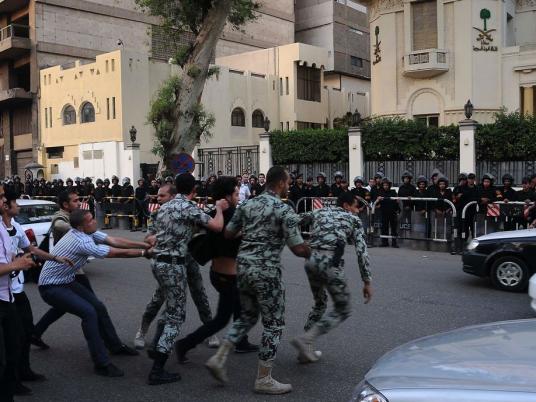
Despite the continued controversies surrounding the upcoming presidential election, Sunday’s front pages are dedicated to what Al-Akhbar describes as a “significant crisis with Saudi Arabia.” The state-owned paper is not alone in reporting on the aftermath of the arrest of Egyptian human rights lawyer Ahmed al-Gizawy by Saudi authorities for allegedly attempting to smuggle narcotics into the kingdom.
Al-Akhbar reports that the Saudi Arabian ambassador to Egypt has been recalled and that the embassy, as well as consulates in Alexandria and Suez, have been temporarily shut down. According to an unnamed Saudi official quoted in the paper, this decision comes as “a direct result of the unjustified demonstrations that have been staged in front of Saudi Arabian institutions” since Gizawy’s arrest.
The majority of Al-Akhbar’s coverage details military ruler Field Marshal Hussein Tantawi’s urgent efforts to contain the escalating crisis. “The field marshal made numerous calls to several Saudi officials,” the paper writes twice in the same paragraph. Tantawi was allegedly rewarded for his efforts with a statement from King Abdullah in which the latter declared that the bond between Egypt and Saudi Arabia was “everlasting” and “stronger than any crisis.” However, that did not stop the field marshal from placing another front-page paragraph’s worth of calls to a presumably different group of “Saudi officials,” according to Al-Akhbar. Tantawi then issued a formal letter of apology to the Saudi king, condemning the “irresponsible actions” of the demonstrators who “do not share the opinion of the Egyptian government.” The Egyptian government has since released a similar letter of apology.
Meanwhile, Al-Ahram’s coverage sees Saudi custom authorities “distributing copies of Gizawy’s handwritten confession to smuggling pills in baby formula packages and Quran-carrying cases.” The state-owned paper also reports on the shutting down of the embassy and consulates, citing a Saudi official’s explanation: “The protests were disrupting the affairs of these institutions, which operate to facilitate Egyptian interests in Saudi Arabia.”
Independent papers tackle the issue from an altogether different angle. “Hired supporters of the former regime hurl insults at the kingdom outside its embassy,” reads the headline on Al-Dostour’s front page, which reports that “a number of Egyptian politicians and diplomats have been urging the nation’s security institutions to help preserve the fraternal bond that links Egypt with Saudi Arabia.” The paper includes an analysis of the situation by former Egyptian Ambassador to Syria Mahmoud Shoukry, who believes that the Saudi decision to recall its ambassador was meant to “indicate to [the ruling military council] that Saudi Arabia is not pleased with the way Egyptian officials have dealt with the situation and allowed its civilians to insult their kingdom.” As a result, Shoukry predicts Gizawy’s trial will be swift, and the verdict extreme, with Saudi officials being recalled in anticipation of further fallout.
As a side note, Al-Dostour reminds readers that “the presidential race officially kicks off tomorrow,” as well as “probable violations of campaigning rules,” which the Presidential Elections Commission has “strongly warned” the 13 eligible candidates against committing. While the committee has yet to “determine the exact regulations of the elections” — it will reportedly “spend the next week studying this issue” — the candidates have been informed that they are not allowed to “endanger each other’s lives, or attempt to dissuade the public from participating in the elections.” The use of religious slogans has also been “prohibited.”
Threatening to throw a wrench in the whole thing is excluded candidate Hazem Salah Abu Ismail, whose supporters swarmed around the Defense Ministry on Saturday in protest while Supreme Council of the Armed Forces member Sami Anan met inside with “members of political forces.” Al-Wafd reports that followers of the Salafi cleric formed a crowd that swelled from the ministry to Abbasseya Square and Ain Shams University, around which they shut down roads. “Army soldiers and police officers were forced to call in special forces as well as the Presidential Guard for backup,” the independent paper reports. Upon arrival, the backup units cordoned the area with barbed wire, which Abu Ismail’s supporters tried to push through, the paper reports. The situation was eventually contained without the armed forces “having to fire a single shot,” an anonymous official explains to Al-Wafd.
Abu Ismail’s supporters claim to have five clear demands: the dismissal of the Cabinet, the amendment of election regulations, the cancellation of Article 28 from the Constitutional Declaration, the enforcement of the political isolation law and the transfer of power to civilian rule on 30 June. According to Al-Wafd, SCAF officials at the Defense Ministry on Saturday suggested that the protesters “go home, and their demands will be considered.” The protesters, the paper reports, opted to stay.
Al-Wafd also covers the “police officer revolution” which has apparently “exploded” in four separate governorates. The paper reports that “hundreds” of police officers across Alexandria, Beheira, Qalyubiya and Sharqiya have taken to the streets, calling for a “purification” of the Interior Ministry with chants such as “Everything’s been staged, the ministry hasn’t changed,” and, “Hey you with the eagle and the hat, we’re you’re brothers, not dogs.” In Daqahlia officers barricaded and “wrapped chains” around the entrances to the local police stations, while in Sharqiya their counterparts “raided the security directorate, kicked out their officials and took over their offices.” The protesting officers have also demanded improvements in their “financial and administrative situations.”
Inexplicably, Al-Tahrir leads with its “exclusive” publication of “expected questions on the secondary chemistry finals,” above an expectation of an altogether different kind. “Mubarak is dying,” the mid-page headline reads, with the report full of assessments from an anonymous “medical source” that the former dictator may well be in his final days. Supplemented with an image of the gray-haired ex-president bundled up in a blanket, bathrobe and sunglasses, and a caption citing his “rapid aging and severe skin discoloration,” the independent paper claims Mubarak has been “losing consciousness for extended periods” and, upon reawakening, remembering “incidents that never occurred, and things that don’t exist.” The former first lady who, Al-Tahrir reports, “is now continuously dressed in black and by [her husband’s] side,” has disclosed to his doctors that Mubarak has been “reminiscing about his childhood.” The independent paper points out that Mubarak’s health took a sudden turn for the worse a few days after it was announced that Tora Prison Hospital had been sufficiently upgraded to accept him.
Egypt's papers:
Al-Ahram: Daily, state-run, largest distribution in Egypt
Al-Akhbar: Daily, state-run, second to Al-Ahram in institutional size
Al-Gomhurriya: Daily, state-run
Rose al-Youssef: Daily, state-run
Al-Dostour: Daily, privately owned
Al-Shorouk: Daily, privately owned
Al-Wafd: Daily, published by the liberal Wafd Party
Youm7: Daily, privately owned
Al-Tahrir: Daily, privately owned
Freedom and Justice: Daily, published by the Muslim Brotherhood's Freedom and Justice Party
Sawt al-Umma: Weekly, privately owned
Al-Arabi: Weekly, published by the Nasserist Party
Al-Nour: Official paper of the Salafi Nour Party




